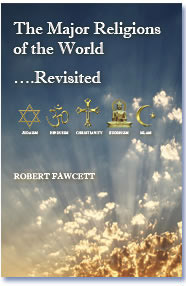| < Previous | Next > |
 Key Islamic Traditions
Key Islamic Traditions
Shahadah (also spelled Shahada), or
Profession of Faith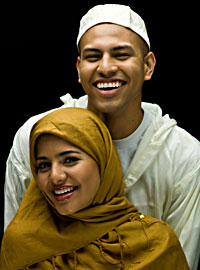
The most important duty of every Muslim in Islamic tradition is the recitation of the creed, or profession of faith, in one version or another: "There is no god but ALLAH, and Muhammad is his prophet."
Muslims will also preface the profession with the words, "I bear witness that...," and replace the word "prophet" favoring the word "messenger" over the more westernized and Judeo-Christian idea of a prophet.
The profession of faith takes its origins from Muhammad's destruction of all deities and idolatrous objects, including money and luxury, from the Arab pantheon except the "One True God." But the profession had an equally significant socio-political implication.
Tribes were the most important unit of political and economic power in the Arab world of Muhammad's time. To be a member of a given tribe, one had to be born into the tribe or, less likely, to marry into the tribe. To become a member of the Islamic ummah (also spelled umma), or community, one had only to make the declaration of faith.
Therefore, this was a momentously consequential end-run around old strictures of power and convention, immediately giving Muhammad, in particular, and Muslims in general, a means of increasing their numbers and powers rapidly, while shattering old expectations and discriminations.
Top ^
Salat, or Prayer in Islamic Tradition 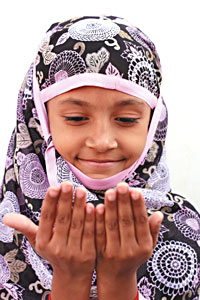
Salat is the Arabic word for prayer. Every Muslim is expected to pray five times a day, always facing Mecca wherever they are in the world. This is done by prostrating either herself or himself in utter humility.
This was not always the case. During Muhammad's time, Muslims initially were required to pray facing Jerusalem, in recognition of the religion of Abraham. This was to be done twice a day, then later, three times a day.
When Muhammad decreed the switch to Mecca, following one of his "revelations," he also decreed the five-times-a-day requirement. It is reported, however, that this was done reluctantly as even Muhammad thought the requirement excessive.
Ibn Ishaq, the 7th century Muslim historian and collector of oral traditions about Muhammad that sourced his first biography, tells the story of Muhammad bargaining with ALLAH on the number of times Muslims should be required to pray.
Initially, according to Ibn Ishaq's retelling, ALLAH told Muhammad that Muslims should pray 50 times a day. On his way down from the throne in Paradise (Heaven), Muhammad encountered Moses, who suggested to Muhammad to go back to God and get the number lowered. Muhammad did so, again and again, until the requirement was reduced to five. Muhammad still thought the number too high, but by then, he was too ashamed to return to God to ask for one more reduction. So, it would be five.
Top ^
Zakat
Zakat is the Arabic word for charity, or alms-giving. Unlike Jesus Christ, Mohammed never condemned either wealth or possessions of this world. He himself had become rather wealthy, working for Khadija, the wealthy merchant-trader who would become his first wife.
Muhammad always respected industriousness, and never required individuals to give away their possessions. Muhammad did, however, oppose hoarding and the amassing of fortunes for fortune's sake. To counter the impulse, he required Muslims always to set aside a portion of their wealth for the poor-a self-imposed tax on income. That amount is 2 1/2 percent of one's wealth. Zakat is at the root of Islam's egalitarian principles (equal political and social rights), a constant reminder that ostentation is against God's will.
Top ^
Sawm, or Siyam - Fasting in Islamic Tradition
Aside from the five-times-daily prayer, fasting during the month of Ramadan is the most visible and recognizable of Muslim acts the world over. During the 30-odd days of Ramadan, Muslims are required to fast during daylight hours, neither food nor drink nor smoke, and abstain from sexual pleasures. Like other Islam traditions, fasting in Islam has its origins in Judaism and Christianity.
The focus is on humility, spiritual oneness with God and social oneness with the ummah, or Islamic community, across the globe.
Ramadan is when Muslims fast mostly (the month when Muhammad receive his initial revelation); although, they may voluntarily fast the rest of the year. They may fast three days a month, or six days during the month of Sawwal (the 10th lunar month), which follows the month of Ramadan. They may fast on Mondays and Thursdays, also. Each of these proscriptions is recognized in Islam.
The purpose of fasting is to make one think, and teaches self-discipline. Fasting sensitizes compassion -- only those who have been hungry can know what hunger means.
Top ^
Hajj, or Pilgrimage to Mecca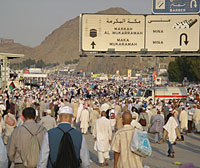
One of the most important in Islamic traditions is the Hajj. Hajj is the pilgrimage to the holy city of Mecca in Saudi Arabia, which every adult Muslim, men and women, is expected to make at least once in his or her lifetime. The hajj is incumbent on every Muslim who is physically and financially able to make the pilgrimage, but only if his absence will not place hardships on his family. A person may perform the hajj by proxy, appointing a relative or friend going on the pilgrimage to "stand in" for him or her.
The hajj is the fifth of the fundamental Muslim practices and institutions known as the Five Pillars of Islam. The pilgrimage rite begins on the 7th day of Dhu al-_ijjah (the last month of the Islamic year), and ends on the 12th day.
At the beginning of a pilgrimage (the major pilgrimage, Hajj, or the minor pilgrimage, Umrah), a pilgrim must enter into state of, or the spirit of, Ihram before crossing the pilgrimage boundary, known as Miqat, by performing the cleansing rituals and wearing the prescribed attire.
A pilgrim is a person who undertakes a pilgrimage, literally 'far afield'. This is traditionally a visit to a place of some religious or historic significance, and a considerable distance is often traveled.
Top ^
A miqat is a designated station where each Muslim must stop to perform certain ritual cleansing ceremonies, and this is called entering into the sacred state of Ihram. A Miqat (meaning, "a stated place") is a designated station. Five of these stations were set up by Muhammad, a sixth being added later for the convenience of travelers from India and points further east. The stations are as follows:
- Dhu'l-hulaifah (also called Dhu'l-Hulayfah) serves pilgrims coming from Medina, or approaching from that direction. This miqat is about 5 1/2 miles from Medina, and about 280 miles from Mecca.
- Rabigh (also called Al-Juhfah), for pilgrims coming from Syria, or for people coming from the direction of Syria. This miqat is about 120 miles to the northwest of Mecca.
- Qarn Al-Manazel, for those coming from the direction of Najd (also called Nejd meaning, "highland") which is the central region of the Arabian Peninsula. This miqat is a hilly place about 55 miles to the east of Mecca.
- Yalamlam (also called, Yaulamlam), for pilgrims coming from Yemen, and others coming from that direction. This miqat is a hilly area about 30 miles to the south of Mecca.
- Dhatu Irq (also called Zat-i-Irq) is the miqat for the people of Iran, Iraq, and those coming from that direction. This miqat is about 55 miles towards the northeast side of Mecca.
- Jeddah (also called Ibrahim Mursia), catering to travelers arriving by sea from India, as well as other countries. This miqat is about 35 miles to the west of Mecca, on the Red Sea.
Once a Muslim arrives at a designated station, they are to perform certain ritual cleansing ceremonies. This is referred to as the sacred state of Ihram. Each male shaves his head, cuts his nails, and trims his beard before donning a white, seamless two-piece garment.
During the period of sanctification, a person must observe certain obligations and prohibitions. These are:
- Males are to keep their head uncovered at all times, but women should keep their heads covered;
- Women are to keep their faces uncovered;
- Men do not shave;
- Men and women do not cut their hair, clip their nails, use either scented cologne or perfume, or wear sewn clothes of any kind; ^^do not perform marriage, or get married yourself;
- Do not kill an animal of any kind for any reason, unless it poses a danger to you and to the others; do not enter into conjugal relations with your spouse;
- Avoid suggestive and provocative talk, or gestures, and remain focused on Hajj
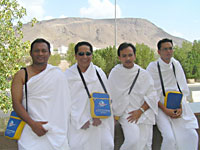
The Ihram garments (right), for men, consist of two pieces of white sheet. Wrap the larger sheet around the waist to cover the body, from the navel to the ankles. Secure the Ihram either with a belt or by a strip of fabric torn from Ihram material. Drape the other sheet over the back and shoulders, and wear a pair of either stitched or unstitched sandals, or shoes, which do not cover the ankles. No underwear should be worn. The Ihram clothing should be preferably white.
Women are allowed to make Ihram in any dress they wish which fulfills the Islamic conditions of public dress, regardless of the color. Women's hands and face should be uncovered in Ihram.
The pilgrimage also includes going to the slopes of Mount Arafat, 16 miles outside of Mecca, in recollection of the covenant between God and Adam, and throwing stones at three pillars in Mina, less than three miles east of the city. The ritual represents the stoning of the devil-or, more accurately in Islamic beliefs, the stoning of the shaitan, as the devil is known in Arabic.
Symbolically, the hajj is as much a return to God as a calling forth the return of Muhammad to Mecca as a conqueror-of the city's "infidels" (meaning, "one without a religion", or "a person who adheres to a religion other than one's own"), as well as of the "true faith." It is a reclaiming of roots, a realization of belonging.
Top ^
Night Journey, or Isra and Mi'raj, or ISRA WA AL-MIRAJ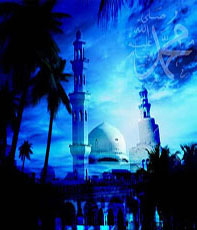
This is also referred to as Laylat al-Isra Wa al-Mi'raj; meaning, "the night journey and ascension." This occurred on the 27th of Rajab (the seventh month of the Islamic calendar -- the vocabulary definition of Rajaba is "to respect," which is where the word Rajab has been derived) is when Muslims believe Muhammad traveled from Mecca to Jerusalem, ascended to heaven from a rock in the Dome of the Rock (the Temple of the Mount for Judaism), and returned to Mecca in one night.
The Temple Mount, also known as Mount Moriah, is the holiest site in Judaism. The Torah records that it was here that God chose to rest His Name and Divine Presence; consequently, the first Jewish Temple was built on this site some 3,000 years ago, 960 BC.
In Islamic tradition, it is known as the Noble Sanctuary. In 691 an octagonal Muslim building topped by a dome was built around the rock; thus, the shrine became known as the Dome of the Rock. In 715 the Umayyads led by the Caliph al-Walid I, rebuilt the Temple's nearby Chanuyos (a storehouse for the Temple of the Mount) into a mosque which they named the al-Aqsa Mosque, or al-Masjid al-Aqsa which "the furthest mosque." This corresponded to the Islam belief of Muhammad's miraculous nocturnal journey as recounted in the Qur'an and hadith. The term the Noble Sanctuary, al-Haram al-Sharif, refers to the whole area that surrounds that Rock.
Due to its importance for Judaism and Islam, it is one of the most contested religious sites in the world.
In Islamic tradition, the Night Journey, Isra and Mi'raj, are the two parts of a journey that the Islamic prophet Muhammad took in one night, around the year 621. Many Muslims consider it a physical journey, but many consider it a dream, or a vision.
A brief sketch of the story is in verses 1 and 60 in one of the Qur'an chapters (17: sura Al-Isra), and other details were filled in from the supplemental writings, the hadith. On this night, Muhammad established Islam's five daily prayers, and prayed with Abraham, Moses, and Jesus, showing that Muslims, Christians, and Jews follow one God. Making this night "holy" reinforces belief that the Dome of the Rock is holy, and promotes the belief that Islam directly follows Judaism.
The Isra begins with Muhammad resting in the Ka'aba in Mecca, when the archangel Gabriel comes to him, and brings him the winged steed Buraq (In Islam, the traditional lightning steed of the prophets). The Buraq then carries Muhammad to the "Masjid al-Aqsa", which according to Muhammad, reported in Hadith by several narrators, equates with "the Noble Sanctuary" in Jerusalem.
Muhammad dismounts, tethers Buraq, and leads the other prophets of Abrahamic descent in prayer. He then re-mounts Buraq, and in the second part of the journey, the Mi'raj, is taken to the heavens. This is where he tours the circles of heaven, and speaks with the earlier prophets such as Adam, Abraham, Moses, Jesus, et cetera, and then is taken by Gabriel to ALLAH.
ALLAH instructs Muhammad that Muslims must pray fifty times a day; however, Moses tells Muhammad that it is very difficult for the people, and they could never do it. He then urges Muhammad to go back several times and ask for a reduction, until finally, it is reduced to five times a day.
After Muhammad returned to Earth and tells his story in Mecca, the unbelieving townspeople regard it as absurd. Some go to Muhammad's companion Abu Bakr and tell him, "Look at what your companion is saying. He says he went to Jerusalem and came back in one night."
Abu Bakr replies, "If he said that, then he is truthful. I believe him concerning the news of the heavens - that an angel descends to him from the heavens. How could I not believe he went to Jerusalem and came back in a short period of time - when these are on earth?" It was for this that Abu Bakr is said to have received his famous title "Us-Siddiq," The Truthful.
Top ^
| < Previous | Next > |




